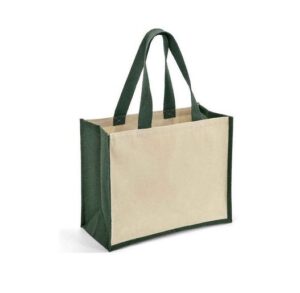Ethical Shopping Bags:Making a Conscious Choice!
Ethical Shopping Bags:Making a Conscious Choice!
In today’s world, where environmental concerns are at the forefront of discussions, ethical shopping bags have risen to prominence as a practical solution for consumers who want to make responsible choices.
This blog explores what ethical shopping bags are, their benefits, the materials used, and how to choose the right one for your needs.
What Are Ethical Shopping Bags?
Ethical shopping bags are products designed with sustainability and social responsibility in mind. Unlike conventional plastic bags, these bags are made from eco-friendly materials and produced under fair labor conditions. The goal is to reduce environmental impact while promoting ethical practices in manufacturing.
The Importance of Ethical Shopping Bags:
1.Environmental Protection:
Plastic bags contribute significantly to pollution and waste in landfills and oceans. By opting for ethical shopping bag, consumers can help minimize this impact. Many ethical bags are reusable, reducing the need for single-use plastics.
2.Sustainable Materials:
Ethical shopping bags often use materials such as organic cotton, jute, hemp, or recycled materials. These materials require less energy to produce and have a lower carbon footprint compared to conventional plastics.
3.Support for Fair Trade:
Many ethical bag manufacturers prioritize fair labor practices. This means that the workers involved in the production process are paid fair wages and work in safe conditions, promoting social equity.
4.Raising Awareness:
Choosing ethical shopping bag can be a statement about consumer values. When people see you using an ethical bag, it can inspire them to consider their own shopping habits and the environmental impact of their choices.
Types of Ethical Shopping Bags:
1.Reusable Tote Bags:
Made from durable materials like canvas or recycled plastic, these bags are ideal for grocery shopping and everyday use. Their sturdy design allows them to hold more items than traditional plastic bags.
2.Organic Cotton Bags:
These bags are made from cotton grown without harmful pesticides or chemicals. They are biodegradable and have a lower environmental impact compared to conventional cotton.
3.Jute Bags:
Jute is a natural fiber that is both strong and biodegradable. Jute bags are perfect for carrying heavier items and can be used multiple times.
4.Hemp Bags:
Hemp is another sustainable material that requires little water and no pesticides to grow. Hemp bags are durable and naturally resistant to mold and UV light.
5.Recycled Plastic Bags:
Some companies use recycled plastics to create new shopping bags. This process helps reduce plastic waste while creating functional products.
Benefits of Using Ethical Shopping Bags:
1.Durability:
Ethical shopping bags are generally more robust than single-use plastic bags, allowing them to carry heavier loads without tearing.
2.Cost-Effectiveness:
While the initial investment in an ethical bag may be higher, the ability to reuse them many times makes them more economical in the long run.
3.Stylish Options:
Ethical shopping bags come in various designs and styles, allowing consumers to express their personal style while making responsible choices.
4.Easy Maintenance:
Most ethical bags can be easily washed and maintained, ensuring they remain clean and usable for a long time.
5.Positive Impact:
By choosing ethical shopping bag, consumers contribute to a more sustainable economy, supporting brands that prioritize environmental and social responsibility.
How to Choose the Right Ethical Shopping Bag?
When selecting an ethical shopping bag, consider the following factors:
1.Material:
Look for bags made from sustainable materials such as organic cotton, jute, or recycled plastic. Ensure that the material aligns with your values regarding environmental impact.
2.Size:
Choose a size that suits your needs. If you often shop for groceries, a larger tote bag may be more appropriate, while smaller bags may work well for quick trips.
3.Design:
Select a design that you find visually appealing and that reflects your personal style. The more you like the bag, the more likely you will use it regularly.
4.Brand Values:
Research the brands you are considering. Look for companies that practice fair trade, use sustainable materials, and have transparent production processes.
5.Price:
While ethical shopping bags may be pricier than traditional plastic bags, consider them an investment in sustainability. Compare prices across different brands to find one that fits your budget.
Tips for Using Ethical Shopping Bags:
1.Always Carry One:
Keep a bag in your car or purse so you’ll always have one on hand when shopping.
2.Proper Care:
Wash your bags regularly according to the manufacturer’s instructions to maintain hygiene and prolong their life.
3.Educate Others:
Talk about the benefits of ethical shopping bags with friends and family to encourage them to make similar choices.
4.Avoid Single-Use Bags:
Make a conscious effort to refuse single-use plastic bags when offered at stores.
5.Get Creative:
Use your ethical shopping bag for other purposes, such as carrying gym clothes, books, or as a beach bag.
Challenges and Considerations:
While ethical shopping bags present numerous advantages, there can be challenges:
1.Availability:
In some areas, it may be difficult to find a wide variety of ethical shopping bags.
2.Initial Cost:
The upfront cost of purchasing ethical bags can be higher compared to single-use plastic bags, which may deter some consumers.
3.Consumer Behavior:
Changing habits can take time; some individuals may forget to bring their reusable bags when shopping.
4.Quality Variability:
Not all products marketed as “ethical” are created equally; it’s essential to research brands thoroughly before making a purchase.
Conclusion:
Ethical shopping bags represent a practical choice for environmentally conscious consumers seeking to reduce their ecological footprint while supporting fair labor practices. By choosing sustainable materials and practices, we not only protect our planet but also promote social responsibility. With various options available, selecting an ethical bag that fits your needs has never been easier.
By making informed decisions about our shopping habits and advocating for sustainability, we contribute to a healthier planet for future generations while enjoying the benefits of durable and stylish shopping solutions. As we move towards a more sustainable future, every small choice counts—starting with what we carry our purchases in.










Leave a Reply